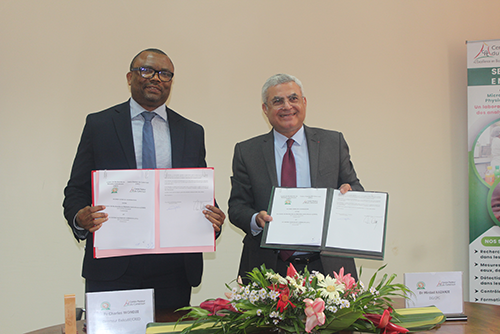This agreement aims to encourage the implementation of joint projects, promote knowledge-sharing and technical capacity building for researchers and students from both parties.

Prof Charles Wondji and Dr Mirdad Karzanji
CRID and Centre Pasteur du Cameroun (CPC) formalized their collaboration this Wednesday 9th April 2025.The two parties intend to cooperate on all areas of Research and Innovation corresponding to their joint activities in health sectors. The specific areas in which this collaboration will apply include: Vector-borne diseases; Neglected tropical diseases; Emerging and re-emerging viral infections; Antimicrobial resistance; Molecular epidemiology and diagnostics… In the long run, the partnership will strengthen research capabilities of both institutions through joint projects, thereby fostering the exchange knowledge and technical expertise. It will promote the development of training programmes designed to improve the skills of researchers and students from CRID and Centre Pasteur, as well as those in low-income countries.
Both parties met at the premises of the CPC in Yaoundé to sign the partnership documents. CRID and CPC were represented by Prof. Charles Wondji and Dr Mirdad Kazanji respectively. This collaboration will make possible the mutualization of resources (laboratories, equipment, data, platforms, etc.) to optimise research capacity and innovation. For Dr Karzanji, “We intend to work together for the benefit of health and the population. The skills and infrastructure we have pooled together will serve the scientific community in Cameroon and beyond. Thanks to CRID’s experience, we will be strengthening our capacities in medical entomology to fight against malaria and arboviruses”. A feeling shared by Prof Charles as he says, “It’s an honour for a young institution like ours to be associated with CPC in this partnership. We want to follow their example in terms of sustainability. Experience has shown us that by pooling our energies, we can seize more opportunities. As we are complementary with Centre Pasteur, we will be able to avoid duplicating efforts while still being effective in what we do”.

Family photo
Both sides expressed a strong desire to see this agreement not just remain on paper, but be translated into action on the ground. As they emphasised several times during their discussions, “alone we go fast, but together we go far”. This win-win partnership heralds a new era for both institutions, making them more competitive in the field of research






